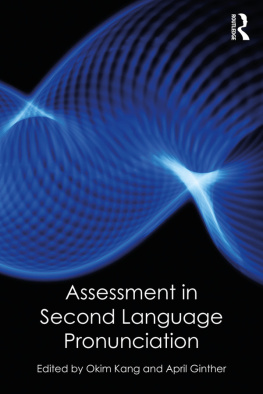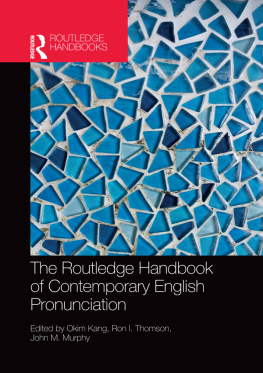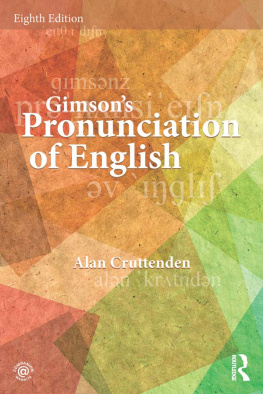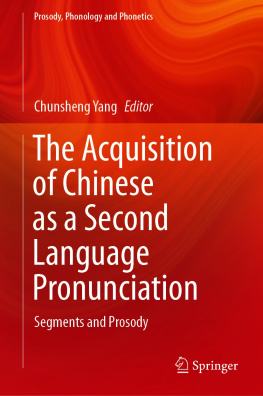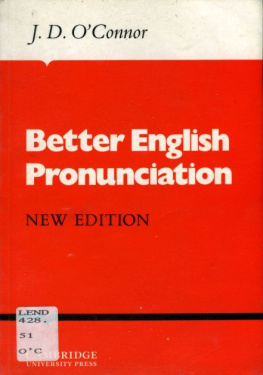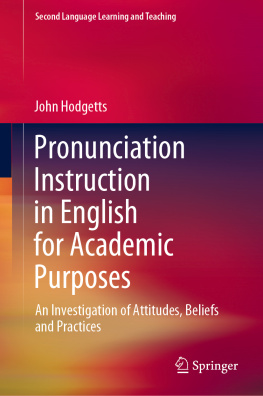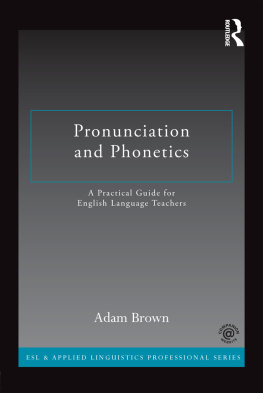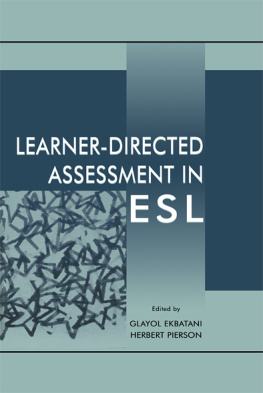
p.i
ASSESSMENT IN SECOND LANGUAGE PRONUNCIATION
Assessment in Second Language Pronunciation highlights the importance of pronunciation in the assessment of second language speaking proficiency. Leading researchers from around the world cover practical issues as well as theoretical principles, enabling the understanding and application of the theory involved in assessment in pronunciation.
Key features of this book include:
Examination of key criteria in pronunciation assessment, including intelligibility, comprehensibility and accentedness;
Exploration of the impact of World Englishes and English as a Lingua Franca on pronunciation assessment;
Evaluation of the validity and reliability of testing, including analysis of scoring methodologies;
Discussion of current and future practice in assessing pronunciation via speech recognition technology.
Assessment in Second Language Pronunciation is vital reading for students studying modules on pronunciation and language testing and assessment.
Okim Kang is Associate Professor of Applied Linguistics/TESL at Northern Arizona University, USA.
April Ginther is Associate Professor of Second Language Studies at Purdue University, USA.
p.iii
ASSESSMENT IN
SECOND LANGUAGE
PRONUNCIATION
Edited by Okim Kang and April Ginther

p.iv
First published 2018
by Routledge
2 Park Square, Milton Park, Abingdon, Oxon OX14 4RN
and by Routledge
711 Third Avenue, New York, NY 10017
Routledge is an imprint of the Taylor & Francis Group, an informa business
2018 selection and editorial matter, Okim Kang and April Ginther; individual chapters, the contributors
The right of the editors to be identified as the authors of the editorial material, and of the authors for their individual chapters, has been asserted in accordance with sections 77 and 78 of the Copyright, Designs and Patents Act 1988.
All rights reserved. No part of this book may be reprinted or reproduced or utilised in any form or by any electronic, mechanical, or other means, now known or hereafter invented, including photocopying and recording, or in any information storage or retrieval system, without permission in writing from the publishers.
Trademark notice : Product or corporate names may be trademarks or registered trademarks, and are used only for identification and explanation without intent to infringe.
British Library Cataloguing-in-Publication Data
A catalogue record for this book is available from the British Library
Library of Congress Cataloging-in-Publication Data
A catalog record for this book has been requested
ISBN: 978-1-138-85686-8 hbk
ISBN: 978-1-138-85687-5 pbk
ISBN: 978-1-315-17075-6 ebk
Typeset in Bembo
by Swales & Willis Ltd, Exeter, Devon, UK
p.vii
p.viii
p.ix
We would like to begin by acknowledging the influence and importance of the annual conference on Pronunciation in Second Language Teaching and Learning (PSLLT) to the genesis of this volume. The conference theme, Setting the Course for Pronunciation Teaching and Assessment , PSLLT, 2012, Vancouver, BC, Canada, and the many inspiring presentations and discussions generated in response, set the course for the development of Assessment in Second Language Pronunciation .
There are many people who we thank for their support during the preparation of this volume. First and foremost, we thank the authors for contributing their work. Their perseverance and persistence in the preparation of the volume are much appreciated. Helen Tredget at Routledge has been of enormous help and support in getting all of the pieces in order and of working with us in the process of finalizing the product. We also thank the anonymous reviewers for their valuable comments and suggestions. Nadia Seemungal-Owen, Senior Editor at Routledge, was instrumental for her initial support and in carrying this book from an idea to its current form. Our thanks go to Dawn Burns as well for her valuable help with copy editing and preparation of the final manuscript.
p.x
Larry Davis is a Managing Research Scientist at Educational Testing Service, Princeton, NJ, USA. His primary research focus is speaking assessment, including speaking constructs, task design, scoring rubrics, rater expertise and behavior, and applications of automated scoring technology. His publications include articles on rater expertise, partner effect in paired oral tests, and the use of rubrics in language teaching.
Slobodanka Dimova is an Associate Professor at the University of Copenhagen, Denmark. Her research interests include language testing and measurement, oral language production, and English medium instruction in higher education. She is the Test Coordinator of the Test of Oral English Proficiency for Academic Staff (TOEPAS) and serves as a Book Editor of the Language Testing journal.
Romy Ghanem is a doctoral candidate at Northern Arizona University, USA. Her primary research interests include speech production and perception as well as language structure. She has conducted research in linguistic and reverse linguistic stereotyping and used corpus methods to examine the formation of genitives. Her current research involves the effect of first language on the speech alignment of different linguistic features.
April Ginther is an Associate Professor of Second Language Studies and Linguistics at Purdue University, USA, where she teaches courses in language testing and quantitative research. Her research interests include the development and use of English language proficiency tests, the integration of testing and instruction, and the measurement of language proficiency over time. She is currently the Co-Editor of the journal Language Testing .
p.xi
Luke Harding is a Senior Lecturer of Linguistics and English Language at Lancaster University, UK. His research interests are mainly in the area of language assessment, particularly listening, speaking, assessor decision-making, language assessment literacy, and the challenges of World Englishes and English as a Lingua Franca for language assessment.
Daniel R. Isbell is a PhD student in Second Language Studies at Michigan State University, USA. His research interests include language assessment, instructed SLA, and L2 pronunciation. Daniel has conducted research on pronunciation instruction and the role of pronunciation in task-based interaction. He has presented his work at international conferences and has published in the journal Language Testing .
Okim Kang is an Associate Professor of Applied Linguistics at Northern Arizona University, USA. Her research specialties are L2 pronunciation, oral proficiency assessment, language attitudes, speech perception and production, and automated scoring systems. She serves on Editorial Boards of several journals (e.g., TESOL Quarterly , Language Testing , Journal of Second Language Pronunciation ) and is Co-Editor of an online journal, TESL-EJ Book Reviews .
Anastassia Loukina is Research Scientist in Natural Language Processing and Speech group at Educational Testing Service, Princeton, NJ, USA. She is a phonetician by training and her research focuses on automated speech scoring and especially the automated evaluation of pronunciation and intelligibility. She published articles on various aspects of automated speech scoring as well as other applications of natural language processing technologies and machine learning in assessment.
Masanori Suzuki is Director of Test Development at Pearsons automated scoring division where he oversees development projects and validation research of automated language assessments. He holds an MA in Teaching English to Speakers of Other Languages (TESOL) from San Francisco State University, USA. His research interests are language testing, SLA, and psycholinguistics.
Next page
